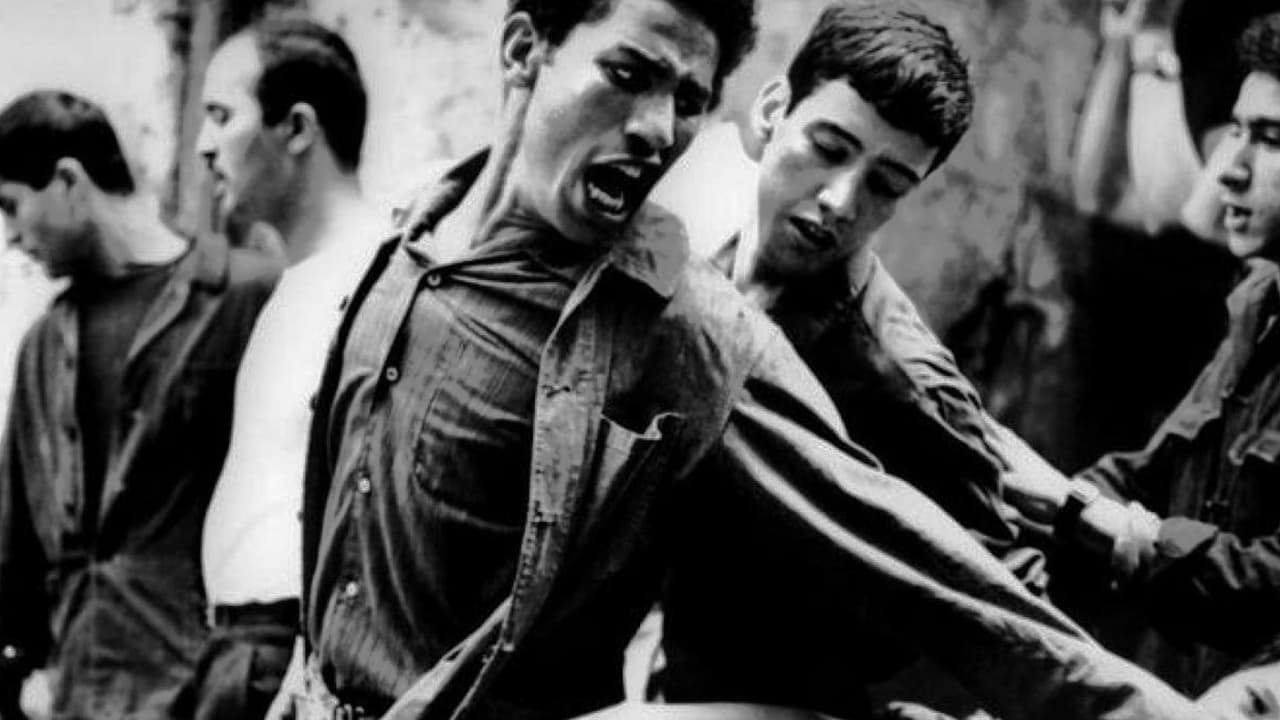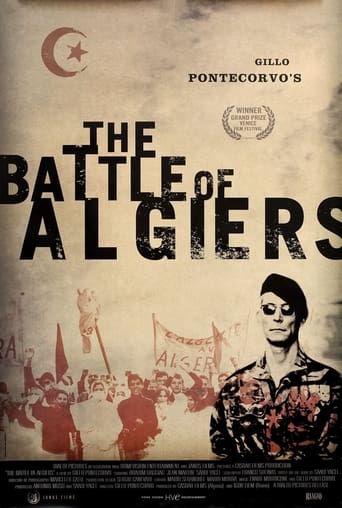

Let's be realistic.
... View MoreHighly Overrated But Still Good
... View MoreA brilliant film that helped define a genre
... View MoreThe tone of this movie is interesting -- the stakes are both dramatic and high, but it's balanced with a lot of fun, tongue and cheek dialogue.
... View MoreTHE BATTLE OF ALGIERS is a war drama film that, in a realistic way, describes events during the Algerian War. On the other hand, it is a traditional view of a conflict between a guerrilla movement for the liberation and a colonial superiority. Mr. Pontecorvo was inspired by the Italian neo-realism, which is evident in authentic locations and his documentary expression. Of course, when it comes to style, I would pull a thin line between this film and the film "Rome, Open City" by Roberto Rossellini. The Battle of Algiers reconstructs the events that occurred in the capital city of French Algeria between November 1954 and December 1957, during the Algerian War of Independence. The story begins and ends from the perspective of Ali la Pointe, a petty criminal who is politically radicalized while in prison. He has joined the secretive organization in order to help rid the Casbah of vice associated with the colonial government. Ali is becoming one of the leading members of the National Liberation Front (FLN). The film traces the rebels' struggle and the increasingly extreme measures taken by the French government to quell what soon becomes a nationwide revolt...This film, in a credible way, shows crimes against civilians, through an uncontrolled guerrilla war in an urban area. We have a very difficult task to draw a parallel between the bombings as one of the terrifying form of terrorism, and the colonial power, which is reflected through different forms of lynchings, torture and intimidation. Colonizer and colonized commit atrocities against civilians. The politicians, as always, tactical discuss some obvious facts. Some scenes from indigenous districts are frightening, while people falling into puddles of blood and after each new news something explodes. There is no some melodramatic plot, direction is too realistic to some part could be ignored.The characterization is very good.Brahim Haggiag as Ali la Pointe is the personification of a guerrilla fighter, who has mixed up his own life purpose and a strong desire for freedom. Saadi Yacef as Djafar is a very convincing as a leader and tactician of the National Liberation Front.Jean Martin as Lieutenant-Colonel Mathieu is a tenacious officer who intends to defeat his opponent, with a certain military respect, at any cost.Well, some have won the battle, while the other have won the war, and many of them have lost their lives.
... View MoreSuperbly done in all aspects. In years of movie viewing I've never seen staged events look so realistic. I don't know how Pontecorvo and Co. managed it, but they did. I first saw the movie in a packed LA theatre in 1967. The place absolutely rocked when the FLN vowed to continue their struggle— shades of the anti-Vietnam war then shaping up. I guess the colonial French learned their lesson in Vietnam and Algeria, a lesson neo-colonial Americans are still learning. Anyway, there's not much I can add to the hundreds of reviews already in place. That is, except to say that what stayed and still stays with me are the peasant faces, etched by years of hardship. Plus, the native quarters with their claustrophobic passageways that resemble a prison more than a neighborhood. No way Hollywood can duplicate these. Thanks Mr. Pontecorvo and all the others for a world-class lesson in movie making and difficult truths.
... View MoreThe Battle of Algiers reconstructs the events that occurred in the capital city of French Algeria between November 1954 and December 1957, during the Algerian War of Independence. The narrative begins with the organization of revolutionary cells in the Casbah. Then partisan warfare between Muslims and Pied-Noir in which both sides exchange acts of increasing violence leads to the introduction of French army paratroopers to hunt the National Liberation Front (FLN). The paratroopers are depicted as winning the battle by neutralizing the whole of the FLN leadership through either assassination or capture. However, the film ends with a coda depicting nationalist demonstrations and riots, suggesting that although France won the Battle of Algiers, it lost the Algerian War.
... View MoreFrom the title I expected this to be a war movie, but I did not realize Algiers is a city, and the battle is actually a struggle for Algerians to live in their home country without fear of the French who are suppressing them.I've seen very critically acclaimed classic foreign films before, so I guess I might have had my expectations too high. For example, two of my favorite foreign films are "Bicycle Thieves" and "Rashomon," but those films actually do interesting things with their camera-work. With The Battle of Algiers we just get a lot of standard (boring) camera-work with a lot of static shots to focus on conversations about the action rather than focusing on the action itself.The best aspect of the film is the characters who are a part of the rebellion and their motivations. We are introduced to one of the main characters in a very interesting way - this secret group of rebels does an initiation on Ali by checking to see if he would be loyal enough to shoot a cop, but they don't tell him this. We can see the manipulation this group exercises, though in their eyes it is necessary recruitment, and we should see it as this too since it is the Algerians who are the victim to French occupation of the city of Algiers as well as of the entire nation of Algeria.With the filmmakers choosing to revisit a scene from different view points there is obviously non-linear chronology, but I only understood this at the beginning and towards the end of the film. I was confused how the scene fit into the scenes surrounding it when it was shown for the second time in the film. I will have to rewatch this film some time in the future - after all it is regarded as one of the most important films ever made.I think I enjoyed the conclusion of this film much more than any part which preceded it, and that's because the conclusion is the most inspirational sequence of the entire movie. It is uplifting to see how Algerians rise up again years after the first rebellion group is decapitated (a metaphor you will understand if you watch the film), and this happens without great explanation. The message implied by the film is that this first group of rebels may not have been successful, but the group inspired the people of its nation to stand strong for justice.
... View More